Jerusalem, a city revered by Judaism, Christianity, and Islam, sits at the heart of religious discourse. Its significance goes beyond mere geography, entwining faith, history, and culture in a mesmerizing manner.
The allure of Jerusalem lies not only in its ancient walls and sacred sites but also in the complex interplay of beliefs and traditions that converge within its confines. As visitors navigate the labyrinthine streets and delve deeper into its spiritual tapestry, they are confronted with a profound and timeless connection that transcends individual religions.
- Good To Know
- Historical Significance of Jerusalem
- Sacred Sites for Judaism
- Importance in Christianity
- Relevance in Islam
- Interfaith Relations in Jerusalem
- Jerusalem’s Cultural Diversity
- Challenges and Conflicts
- Future Prospects and Unity
- Frequently Asked Questions
- How Does the Modern-Day Political Situation in Jerusalem Impact the Daily Lives of Its Residents and Visitors?
- What Measures Are in Place to Ensure the Preservation and Protection of the Sacred Sites in Jerusalem From Potential Threats or Damages?
- How Do the Local Communities in Jerusalem Navigate and Reconcile Their Diverse Cultural and Religious Identities in Their Daily Interactions?
- What Initiatives or Programs Are Being Implemented to Promote Interfaith Dialogue and Understanding Among the Different Religious Communities in Jerusalem?
- What Are Some of the Key Challenges Faced in Achieving Lasting Peace and Unity in Jerusalem, and What Strategies Are Being Proposed to Address These Issues?
- The Sum Up
- More Tour Reviews in Jerusalem
- Looking for something different? Other Jerusalem activities we've written about
Good To Know
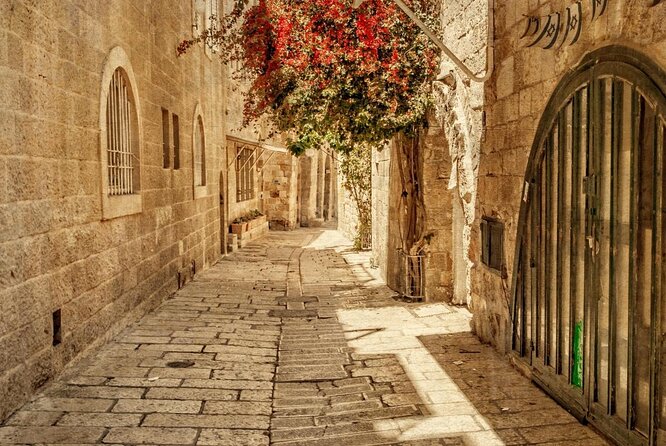
- Jerusalem serves as a unifying focal point for Judaism, Christianity, and Islam.
- The city’s sacred sites embody shared histories and spiritual significance for believers.
- Interfaith dialogue and cooperation in Jerusalem exemplify peaceful coexistence among diverse faith communities.
- Jerusalem’s enduring importance as a pilgrimage destination underscores its centrality in the beliefs of three major monotheistic religions.
Historical Significance of Jerusalem
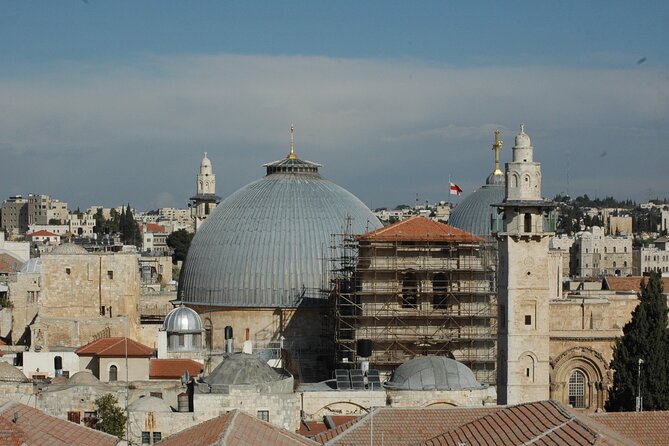
With its rich history spanning across millennia, Jerusalem stands as a city of profound historical significance for the three monotheistic religions. The city’s historical importance is underscored by the plethora of archaeological evidence that has been unearthed over the years, shedding light on its ancient past and validating its religious significance.
Jerusalem’s status as a religious pilgrimage site further solidifies its place as a hub for spiritual seekers from around the globe. The opportunity to visit sacred sites and walk in the footsteps of prophets and religious figures adds a deeply personal and transformative dimension to the experience of those who embark on this journey.
The allure of Jerusalem as a center of faith and history continues to captivate and inspire visitors seeking to connect with their religious roots.
Find more activities and experiences we've covered in Jerusalem.
Sacred Sites for Judaism
Judaism boasts a myriad of sacred sites in Jerusalem that hold profound religious significance for believers worldwide. These sites include:
- The Western Wall – a remnant of the Second Temple and a place of prayer and pilgrimage.
- The City of David – an ancient site showcasing archaeological discoveries linked to King David.
- Mount of Olives – a significant burial site and a spot where many important events in Jewish history are said to have taken place.
- The Hurva Synagogue – a symbol of Jewish resilience and restoration, rebuilt after its destruction.
These locations not only serve as pilgrimage sites but also offer a glimpse into the rich history and spiritual connection that Judaism has with Jerusalem.
Importance in Christianity
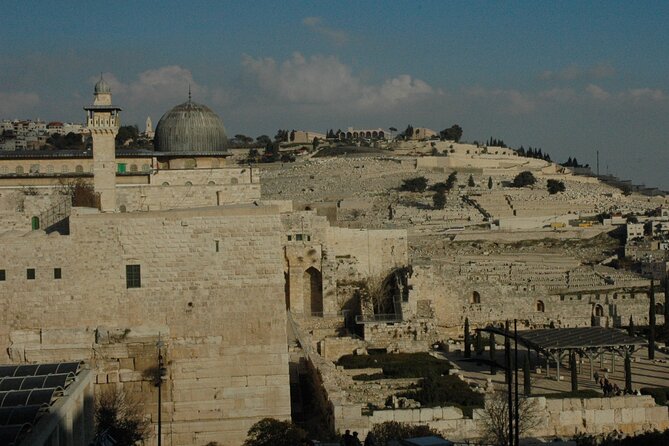
Exploring the historical and religious significance of Jerusalem, the city holds a profound importance for Christianity as well. Jerusalem is a central destination for Christian pilgrimage, drawing believers from around the world to walk in the footsteps of Jesus Christ.
The city’s significance in Christianity is deeply rooted in its biblical connections. Jerusalem is mentioned numerous times in the Bible, particularly in relation to the life and ministry of Jesus.
The Old City of Jerusalem, with its iconic sites such as the Church of the Holy Sepulchre and the Via Dolorosa, serves as a focal point for Christian worship and reflection. For Christians, Jerusalem isn’t just a place on a map but a sacred space where faith and history converge.
Relevance in Islam
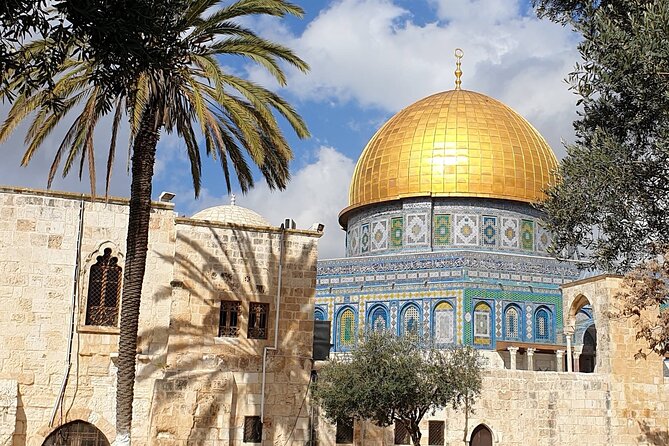
Jerusalem holds immense significance in Islam, serving as a pivotal focal point for Muslim devotion and history. In the Islamic perspective, the religious significance of Jerusalem is profound, shaping beliefs and practices.
Here are four key elements highlighting its importance:
Al-Aqsa Mosque: Considered the third holiest site in Islam, Muslims believe Prophet Muhammad was transported from Mecca to Jerusalem during the Night Journey.
Dome of the Rock: This iconic golden-domed shrine marks the spot where Muslims believe Prophet Muhammad ascended to heaven.
Historical Connections: Jerusalem is intertwined with Islamic history through the early Muslim conquests and the Umayyad Caliphate.
Qibla Change: Initially facing Jerusalem in prayer, Muslims later shifted the Qibla to Mecca, emphasizing Jerusalem’s initial importance in Islam.
Interfaith Relations in Jerusalem
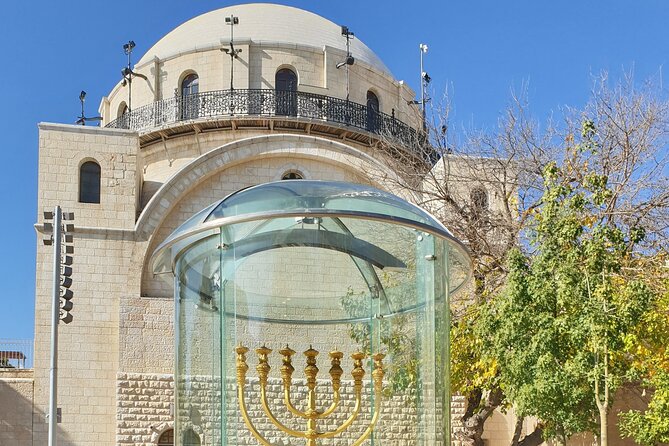
In understanding the dynamic fabric of Jerusalem’s religious tapestry, the interactions between different faiths in the city reveal a rich and intricate history of coexistence and shared spaces.
Peaceful coexistence has been a cornerstone of Jerusalem’s interfaith relations, where communities have often come together to promote understanding and harmony. Religious dialogue plays a vital role in bridging divides and fostering mutual respect among followers of Judaism, Christianity, and Islam.
Through initiatives such as interfaith prayers, dialogues, and cultural exchanges, Jerusalem continues to be a beacon of hope for peaceful interactions between people of different beliefs.
Despite challenges, the city serves as a testament to the possibility of unity amidst diversity, showcasing the power of respectful cohabitation among various faith traditions.
- Hebron Dual Narrative Tour From Jerusalem
- Ashdod Shore Excursion: Jerusalem and Bethlehem – for Cruise Ship Guests Only
- 3-Day Petra and Wadi Rum Tour From Jerusalem
- Travel From Jerusalem To Bethlehem and Dead Sea – Daily Group West Bank Tour
- Travel to Bethlehem, Jericho & Jordan River – Group Guided Tour From Jerusalem
- JERUSALEM Private Tour With ELAD VAZANA – Life in Israel & Palestine Then & Now
Jerusalem’s Cultural Diversity
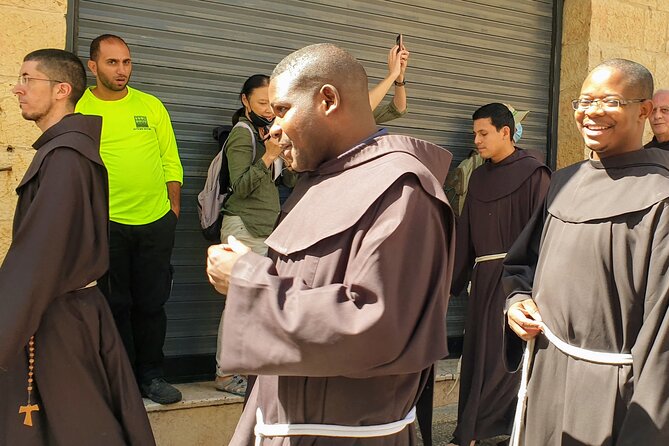
With its mosaic of traditions and customs, Jerusalem’s cultural diversity weaves a vibrant tapestry of heritage and contemporary expression. This rich tapestry is evident through:
The bustling markets where vendors sell goods from various cultural backgrounds, creating a lively atmosphere of cultural exchange.
The diverse array of religious sites coexisting harmoniously, showcasing the city’s commitment to religious coexistence.
The eclectic mix of culinary delights, offering a taste of the different cultures that call Jerusalem home.
The vibrant arts scene, where traditional and modern art forms blend together, reflecting the city’s dynamic cultural landscape.
In Jerusalem, cultural exchange and religious coexistence aren’t just ideals but living realities that shape the city’s unique identity.
Challenges and Conflicts
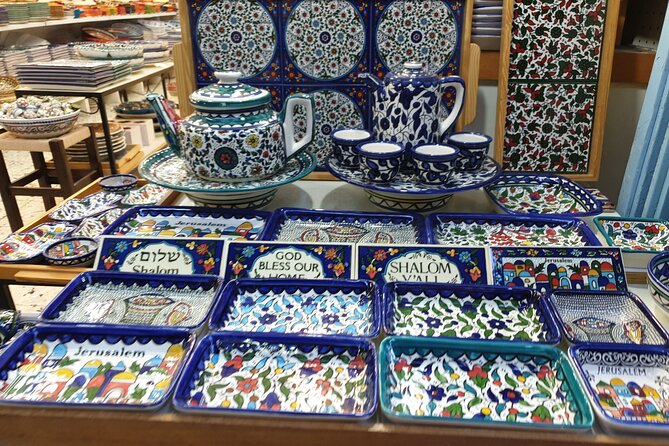
Navigating the intricate tapestry of cultural diversity in Jerusalem reveals not only harmonious coexistence but also sheds light on the underlying challenges and conflicts that shape this dynamic city. In Jerusalem, political tensions and religious disputes often intersect, adding layers of complexity to the city’s landscape. The table below highlights some of the key challenges and conflicts faced in Jerusalem:
| Challenges | Conflicts |
|---|---|
| Political tensions | Religious disputes |
| Territorial disputes | Historical rivalries |
| Socio-economic gaps | Ideological differences |
| Security concerns | Cultural clashes |
Future Prospects and Unity
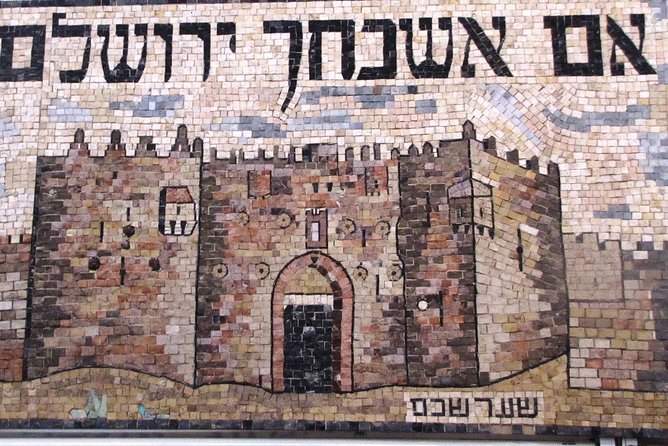
Glimpsing ahead, the potential for future unity in Jerusalem sparkles like a beacon of hope amidst the historical tapestry of challenges and conflicts. Embracing future prospects for religious harmony, there’s a sense of optimism that prevails in the air. Here’s a visual representation of what this unity could entail:
- Interfaith dialogues where leaders and members of all three religions engage in open discussions.
- Joint religious celebrations held in shared spaces to foster understanding and mutual respect.
- Collaborative community projects that benefit all residents, regardless of their religious background.
- Educational initiatives promoting tolerance and acceptance from a young age.
Through these avenues, the path towards future unity in Jerusalem appears promising and full of possibilities.
Frequently Asked Questions
How Does the Modern-Day Political Situation in Jerusalem Impact the Daily Lives of Its Residents and Visitors?
The modern-day political situation in Jerusalem significantly influences the daily lives of residents and visitors. The impact on tourism and socio-political dynamics shapes interactions, perceptions, and experiences in this diverse and historically significant city.
What Measures Are in Place to Ensure the Preservation and Protection of the Sacred Sites in Jerusalem From Potential Threats or Damages?
Preservation measures in Jerusalem include regular monitoring, security patrols, and collaboration with local authorities. Threat prevention involves advanced technology, trained personnel, and community involvement. These efforts safeguard the sacred sites from potential threats or damages.
How Do the Local Communities in Jerusalem Navigate and Reconcile Their Diverse Cultural and Religious Identities in Their Daily Interactions?
Local communities in Jerusalem foster interfaith harmony through mutual respect and cultural exchange. They navigate diverse identities by embracing dialogue and shared traditions. By acknowledging differences and promoting understanding, they cultivate a rich tapestry of coexistence.
What Initiatives or Programs Are Being Implemented to Promote Interfaith Dialogue and Understanding Among the Different Religious Communities in Jerusalem?
Interfaith dialogue and community initiatives in Jerusalem foster mutual understanding among diverse religious groups. Programs such as shared cultural events and educational forums promote unity and respect. These efforts encourage peaceful coexistence and bridge religious divides.
What Are Some of the Key Challenges Faced in Achieving Lasting Peace and Unity in Jerusalem, and What Strategies Are Being Proposed to Address These Issues?
Addressing conflict in Jerusalem involves navigating complex historical, religious, and political tensions. Peacebuilding strategies include dialogue, mutual recognition, and trust-building initiatives. Engaging all stakeholders, promoting understanding, and fostering empathy are crucial for lasting unity.
The Sum Up
To sum it up, Jerusalem’s profound significance for Judaism, Christianity, and Islam is undeniable. The city’s rich history, sacred sites, and cultural diversity make it a truly unique destination for spiritual exploration.
Despite the challenges and conflicts that exist, the future prospects for unity and interfaith relations in Jerusalem are promising. By coming together to appreciate and respect each other’s beliefs, Jerusalem can continue to serve as a beacon of faith and cultural heritage for generations to come.
More Tour Reviews in Jerusalem
Looking for something different? Other Jerusalem activities we've written about
- 3 Best Workshops And Classes In Jerusalem
- 4 Best 3 Day Tours In Jerusalem
- 25 Best Tours In Jerusalem
- 11 Best 2 Day Tours In Jerusalem
- 4 Best Shopping Tours In Jerusalem
- 19 Best Private Driver Services In Jerusalem
- 18 Best Full-Day Tours In Jerusalem
- 25 Best Guided Tours In Jerusalem
- 3 Best 4 Day Tours In Jerusalem
- 24 Best City Tours In Jerusalem
- 3 Best Photography Experiences In Jerusalem
- 2 Best Massage And Relaxation Services In Jerusalem
